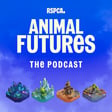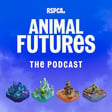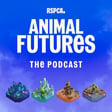
Episode 2 - Working as an Animal Rescue Officer with Lydia Andrews
Welcome to Walk on the Wild Side, an RSPCA podcast. We’ll meet people from this 200-year-old animal welfare charity, and learn about what they do. We’ll discover more about the amazing wildlife all around us, and how we can help it thrive, and be inspired to get outdoors and into nature.
In this episode Holly Cushen takes a walk in the woods near RSPCA Newbrook Farm with Lydia Andrews, an RSPCA Animal Rescue Officer. So much of the RSPCA’s work is with people as much as with animals – our frontline workers collaborate with the public, agencies like Fire and Rescue, and specialist teams to help individual animals. They also help to educate people on how to look after both wildlife and pets. Lydia and Holly also chat about some memorable animal rescues, the need for a boat team in Birmingham, and the 200-year history of the RSPCA, and watch a film on how to make gardens inviting to wildlife.
Host: Holly Cushen
Writers: Holly Cushen and Morwenna Kearns
Producer: Morwenna Kearns
Audio producer: Chris Attaway
Wildlife advisor: Rebecca Machin
Executive producer: Sarah Millerick
Recorded on location at and around RSPCA Newbrook Farm in Birmingham
Wildlife advice: rspca.org.uk/adviceandwelfare/wildlife
Wildlife in your garden video: youtube.com/watch?v=FiIJ3e52csA
Work for the RSPCA: jobs.rspca.org.uk/jobs/home
More information on how to get involved: rspca.org.uk/getinvolved/donate/audio



